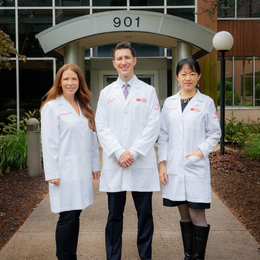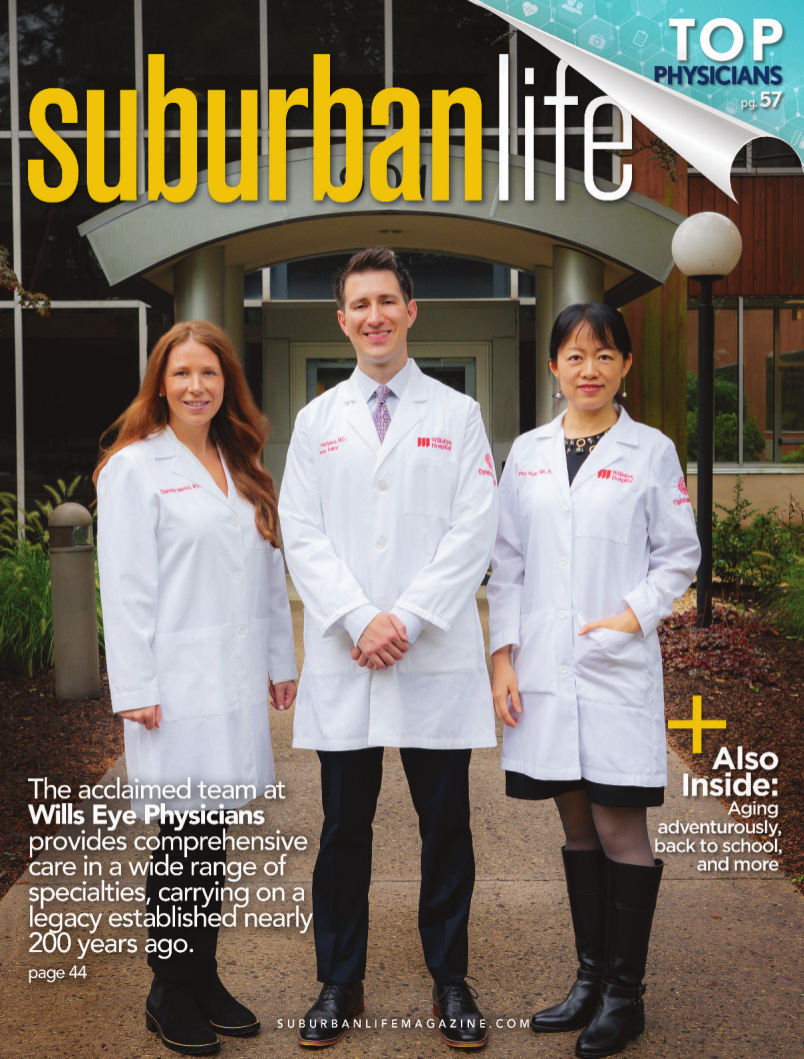
A Sight to Behold
The acclaimed team at Wills Eye Physicians provides comprehensive care in a wide range of specialties, carrying on a legacy established nearly 200 years ago.
For an ophthalmologist or optometrist, the opportunity to become affiliated with Wills Eye Hospital is kind of like a baseball player joining the Philadelphia Phillies. Becoming part of a renowned organization with a rich history, and working side by side with some of the most respected doctors in the country, is simply too good to pass up.
“It’s been a dream come true to work here,” says Nicholas Hadjokas, M.D. “Most of the doctors are leaders in the field, and it’s such a collaborative community where everyone is willing to help each other. To be part of that and to have those resources, and to try to maintain that level of excellence, is what inspired me to pursue a fellowship here and then stay here for my job.”
Dr. Hadjokas recently completed a demanding yet professionally fulfilling cornea fellowship at Wills. He has since joined the clinical staff at Wills Eye Physicians King of Prussia, where the goal is to bring the same world-class care and services available in Philadelphia to suburban residents. He specializes in cornea, cataract, and primary eye care, and welcomes patients to be treated in a warm environment where comprehensive treatment options and state-of-the-art equipment are standards.
“If you’re wearing glasses, we recommend a checkup every year or two to make sure the prescription is normal,” he says. “Our eyes very much affect our quality of life, so if patients can’t perform or enjoy life to the fullest, it’s important to diagnose what’s going on and get them on the right treatment regimen.”
Dr. Hadjokas’ areas of expertise include full-thickness corneal transplants and partial-thickness DSAEK and DMEK corneal transplants for patients experiencing vision loss as a result of a cornea damaged by a range of infectious diseases, dystrophies, or keratoconus. The success rate is quite high, he notes, with visual recovery happening within a week for the partial-thickness procedures, and gradual improvement leading to full-vision potential within a year for the full-thickness surgeries.
He also treats cataracts, a common part of the aging process. While everyone has the potential to develop cataracts, only those who notice an effect on their vision will need surgery.
“There are complex scenarios,” he says. “I’ve had some experience with different disorders can make the lens more loose in the eye or make the lens a little bit more challenging to remove. But routine cataract surgery in most patients is pretty commonly performed and pretty quickly performed, too.”
Dr. Hadjokas, who also offers LASIK and PRK evaluations at the King of Prussia office, is happy to help patients in any way possible. He followed his father, a dentist, and his mother, an occupational therapist, into health care, so that example was set early in life.
“Seeing how they interacted with patients and how they enjoyed their careers inspired me to pursue health care,” he says. “The patient outcomes and the impact you can have on their quality of life really bring a lot of job satisfaction too. It’s hard to find an unhappy ophthalmologist, because when the patients are happy, they’re generally happy, and I’ve found that for myself.”
Joining Dr. Hadjokas at Wills’ suburban office locations will be Charlotte Marous, M.D., and Ping Huang, M.D., Ph.D. In addition to their presence in Center City, Dr. Huang sees patients part-time in King of Prussia, while Dr. Marous sees patients at the Wills Eye Paoli and Plymouth Meeting offices. Both bring unique subspecialties to the Wills network.
Dr. Marous recently completed a rigorous, two-year fellowship, and specializes in all aspects of oculoplastics and orbital surgery. She appreciates the wide range of cases she sees in her field, working with children all the way up to seniors, and the opportunity to exercise her creativity.
“I branch it into two main categories: functional, which is more a medical necessity; and cosmetic, which is people who want to enhance their aesthetic,” she says. “You can subdivide that into congenital or pediatric abnormalities that they were born with, or it could be trauma-related where they have sustained an orbital fracture or a laceration to the tissue around the eye that needs to be repaired. Or it could simply be aging changes—as the patient ages, they develop droopy eyelids or have bags under their eyes, and those are all things that I can fix. There are also tumors, and that includes skin cancer around the eyelid or tumors in the eye socket.”
Dr. Marous believes oculoplastic surgeons are uniquely qualified to treat complex issues dealing with the eyelids, which are among the thinnest tissues in the body. The doctors at Wills, including those in the King of Prussia location, have established themselves as innovators.
“I’m very excited and honored to work for them, and I hope to carry on their name and legacy in my own practice,” she says. “It’s a standard of excellence that I really appreciate and take to heart. Every day I walk into work, I’m going to work my hardest and try to maintain that level of excellence. It was definitely something that drew me to Philadelphia; the opportunity to work with the best of the best here was very appealing.”
Dr. Huang joined the Wills Eye team last March and adds her expertise as a glaucoma specialist with more than 20 years of clinical experience. She says glaucoma usually occurs because of eye pressure that damages the optic nerve. The three main methods for lowering the eye pressure are medication, laser treatment, and surgery—both minimally invasive and, for more serious cases, traditional.
“The public awareness of glaucoma is pretty low,” Dr. Huang explains. “Most of the time, it doesn’t have any symptoms, so if you don’t check your eyes you won’t know if you have it until it’s too late. Glaucoma can cause irreversible vision loss, so we need to catch it as early as possible. African Americans are at higher risk, so if you’re African American and over 40, or you have a family member with glaucoma, I recommend getting an eye exam.”
Dr. Huang stresses that glaucoma is not curable. Even after surgical intervention to help manage the disease, patients must follow up regularly with their doctor and continue to control it, or risk losing their vision.
She is pleased with the attention glaucoma receives at Wills Eye, and the opportunity the practice affords her to impact many patients’ lives.
“I’ve loved it here,” she adds. “I feel like my colleagues are very capable doctors and world-renowned, and I’m honored to be working with them every day. Wills Eye gets so many referrals of glaucoma patients with complicated cases, and I think I can reach my potential and become an even better glaucoma specialist here.”
Wills Eye Physicians King of Prussia
901 E. Eighth Ave., Suite 101
King of Prussia, PA 19406
(610) 265-1188
willseye.org/wills-eye-physicians-king-of-prussia
901 E. Eighth Ave., Suite 101
King of Prussia, PA 19406
(610) 265-1188
willseye.org/wills-eye-physicians-king-of-prussia
Photo by Jody Robinson
Published (and copyrighted) in Suburban Life, August 2023.



